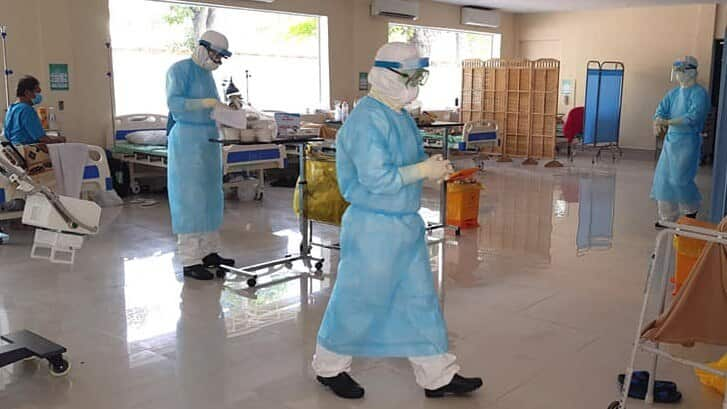Cambodia is one of few mainland countries to have recorded zero deaths from COVID-19, despite having an underfunded healthcare system.
At the time of publishing this article, Cambodia has recorded a total of 448 COVID-19 cases and zero deaths.
On the same day, the UK recorded more than 38,000 new cases with 1,820 COVID-19 related deaths.
Although the two countries are not comparable in terms of population or healthcare system, it offers a comparison idea of how the virus has affected two countries vastly differently.
So different, it seems almost unbelievable. Frances Daily, a medical doctor who has worked in Cambodia for more than two decades, was initially sceptical at their numbers but is now convinced their success is legitimate.
Frances Daily, a medical doctor who has worked in Cambodia for more than two decades, was initially sceptical at their numbers but is now convinced their success is legitimate.

Source: Meng Phalla
“It is astonishing,” she said from her home in Tasmania.
“I thought we were going to get slaughtered [by COVID-19] there … but after the first few months of the pandemic, it became apparent that they really didn't have many cases. ”
Dr Daily has worked in infection control and medical education in Cambodia. She said that if cases and deaths were higher than the official numbers, the health crisis would be too big to hide.
“There would be recorded deaths, absolutely, if the spread of COVID-19 was far beyond what was recorded.”
Professor McLaws, who is a UNSW professor and advisor to World Health Organisation Infection Control and Prevention Guidance Development Group for COVID-19, said that border controls and culture go a long way in explaining Cambodia’s success.
“Deaths are a fairly good indication that COVID-19 is not widespread, even if some positive cases have not been recorded, and that they've been very fortunate.”
Restrictions and border control
Initially, Cambodia downplayed the virus, and in February last year it refused to close its borders. Cambodia's Prime Minister Hun Sen even said he wanted to visit Wuhan. He ultimately visited Beijing and closed the country’s borders just weeks later.
Schools, universities and entertainment venues were then shut. Domestic travel was even banned for a week early in the pandemic.
The country has continued its strict border controls and suspended its e-visa and visa-on-arrival programs, resulting in almost no tourism. Travellers who are eligible to enter must provide a negative COVID-19 test result that is no older than 72 hours. Those testing positive are required to quarantine at a government-assigned facility, and those with a negative result are required to quarantine at their own accommodation for 14 days.
Some restrictions have now eased, with schools and other venues open.
The Cambodian government has the power to restrict people's freedom of travel, assembly and work as well as their right to privacy. The government can fine people up to $250,000 or imprison them for up to 10 years if they are found guilty of disobeying or obstructing the implementation of emergency measures adopted by the government.
Age and regional population
Cambodia has a population of 16.8 million people with seventy-five per cent of the population living in regional areas. In Australia, 71 per cent live in capital cities.
This reduces the risk of the rapid spread of the virus if there is an outbreak.
Sixty-five per cent of the population is under 30, reducing the risk of severe symptoms and comorbidities, leading to COVID-19 death.
Culture
Like many Southeast Asian countries, Cambodia embraces face masks and greetings often don’t involve physical contact -- opting for bowing rather than hugging.
Social events and living styles are largely outside, which is known to help limit the aerosol spread of the disease.
Diplomacy and regional goals
Cambodia's neighbours Thailand and Vietnam have also been comparatively successful in controlling the pandemic, which has helped Cambodia.
The World Health Organisation helped coordinate assistance and the World Bank approved more than $20 million in credit to support Cambodia's COVID-19 response project. The EU has offered more than $60 million to combat COVID-19 and revive the economy.
Dr Daily said it's likely the country feels the pressure to perform just as well as their neighbours, with citizens committed achieving the same low COVID-19 rates as their neighbours.
During a small outbreak at one of Cambodia’s few major shopping malls in November, village leaders acted as voluntary contact traces, going from door to door checking if people had visited the site.
“They mobilise communities and everybody knows that they are accountable. There is this strong sense of keeping it out,” Dr Frances said.
"They smashed that November cluster very quickly.”
Dr Daily said a change in seasons and a spike Thailand’s cases may impact Cambodia’s good record.
“If there is a time that they might have a major outbreak it is likely now with cooler, drier weather, positive cases crossing from Thailand.”
Share
Dateline is an award-winning Australian, international documentary series airing for over 40 years. Each week Dateline scours the globe to bring you a world of daring stories. Read more about Dateline
Have a story or comment? Contact Us


